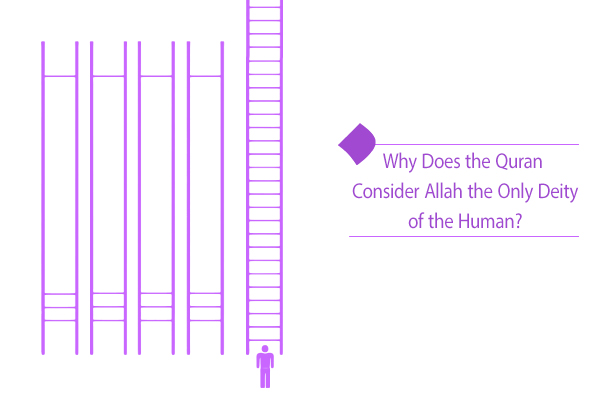Despite the Existence of Other Beloveds, Why Is God the Only Deity of the Human Being?
To answer this question, we first need to explain the meaning of “deity” in “There is no deity but Allah” (la ilaha illallah). Generally, “deity” refers to something which, through ‘compatibility,’ becomes the ‘beloved’ of its lover. This love creates ‘desire,’ and as a result of this desire, we regulate our actions and plans to reach our beloved.
The needs of our five faculties are the beloved or ‘deity’ of each faculty, that means something becomes so beloved to us and captivates us in a way that it controls our actions and reactions. This love underlies all our inclinations and desires; basically, the absence of inclination and desire towards the needs of the dimensions of existence is considered a sign of disruption in our hierarchy of love and our illness in that dimension. A person who has no desire and appetite for food becomes malnourished and physically weak over time. Someone who lacks the desire to gain knowledge – in any of its branches – suffers from the chronic disease of ignorance. Now, since the existence of these deities is essential for our life, what is the true meaning of the concept, “There is no deity but Allah,” which negates the existence of any beloved other than Allah and acknowledges that Allah is the only deity of the human being?
In Islam, rules and laws have been defined for us in all aspects of our lives, placing us within a specific framework. However, we need to understand firstly, which aspect of our existence these rules and laws address, and secondly, which part of our existence is targeted by these commands, prohibitions, and restrictions.
Which Part of Our Existence Is Addressed?
Generally, commands and prohibitions become relevant when the recipient has free will. We know that in each of our existential levels— inanimate, vegetative, animal, and intellective— we share common existential qualities with inanimate objects, plants, animals, and angels, respectively. Likewise, we know that the needs of these levels are instinctively addressed. This means that fundamentally, none of the levels of our existence, whether inanimate, vegetative, animal, or even intellective, can be the recipient of a religion that is full of commands and prohibitions. If such a thing were possible, prophets would be sent by God to guide plants, animals, and angels towards eternal bliss! Therefore, the recipient of religion, in all its aspects and laws, is solely the supra-rational or supra-immaterial faculty, or the human dimension of our existence.
Earlier, we mentioned that each level of existence, based on its compatibility, love, and desire, has a beloved for itself, which we call a deity. Since our human dimension is divine in essence, it is compatible with God, and for this reason, it is inherently in love with that Absolute Perfect. In fact, none of the perfections of the lower levels of our existence are compatible with our human dimension to be able to be the only of the human being. This dignity is only given to our human dimension to have God as the only beloved. Allah is the only deity of the human, and in the monotheistic slogan “There is no deity but Allah,” the existence of any deity other than Allah is negated; it means since the Spirit of Allah has been breathed into our human dimension, fundamentally no deity other than Allah has the possibility of manifesting itself in that dimension, and our supra-rational faculty finds peace only in the embrace of Allah. Each level of our existence has its own beloved and deity; however, we must state that the only deity of the human dimension is only and only God, and this means “La ilaha illallah.“
The Reason for the Existence of Other Beloveds
But what is the philosophy behind the existence of the beloveds of other dimensions of our existence? In fact, until we do not actualize the potentials of the vegetative level, such as physical growth, bodily strength, and reproductive capability, we will not acquire the ability to enter animal life. On the other hand, if we lack animal life, we will be confined to the realm of vegetative life. This means that for the continuation of life, growth, and actualizing the potentials of each level of existence, there is a mutual relationship between the higher and lower levels of existence. Therefore, God has instilled in human beings a love for pleasures and blessings. He actually wants us to have all the pure blessings and provisions which are earned in a lawful manner and make each dimension of existence reach its beloved and deity[1].
When a person reaches the status of being a human and his human dimension rules over his other dimensions, it is desirable for him to bring each of the inanimate, vegetative, animal, and intellective dimensions to their deity and beloved. This act is also rewarded in the hereafter because it is considered obedience to the command of God. Such a person knows how much he should actualize the potentials of the different parts of his existence and uses them to empower and strengthen his supra-rational faculty because he knows that Allah is the true beloved and the only deity of the human being.
In short, we realized that when we say Allah is the only deity of the human and put other beloveds outside the circle of “There is no deity but Allah” it does not mean that we should eliminate them. Rather, because religion only addresses our human dimension, it defines other beloveds in relation to this dimension and puts them at its service.
References
[1]. Quran, 7:32

